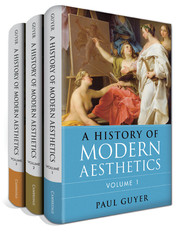Book contents
- Volume 1 The Eighteenth Century
- Volume 2 The Nineteenth Century
- Frontmatter
- Contents
- Acknowledgments
- Introduction
- Part One German Aesthetics in the First Half of the Nineteenth Century
- Part Two (Mostly) British Aesthetics in the Second Half of the Nineteenth Century
- 5 Ruskin
- 6 Aestheticism
- 7 Bosanquet and Tolstoy
- Part Three German Aesthetics in the Second Half of the Nineteenth Century
- Bibliography
- Index
- Volume 3 The Twentieth Century
- References
5 - Ruskin
from Part Two - (Mostly) British Aesthetics in the Second Half of the Nineteenth Century
Published online by Cambridge University Press: 05 June 2015
- Volume 1 The Eighteenth Century
- Volume 2 The Nineteenth Century
- Frontmatter
- Contents
- Acknowledgments
- Introduction
- Part One German Aesthetics in the First Half of the Nineteenth Century
- Part Two (Mostly) British Aesthetics in the Second Half of the Nineteenth Century
- 5 Ruskin
- 6 Aestheticism
- 7 Bosanquet and Tolstoy
- Part Three German Aesthetics in the Second Half of the Nineteenth Century
- Bibliography
- Index
- Volume 3 The Twentieth Century
- References
Summary
Ruskin, Turner, and Truth
The most significant figure in nineteenth-century British aesthetics was not a professor of philosophy, nor a professor of any kind at all until late in his career, when John Ruskin (1819–1900), art critic and social critic, became the first Slade Professor of Fine Art at Oxford. But the history of aesthetics can hardly be told without an account of Ruskin, who, although he only occasionally mentioned names from the British and German philosophical aesthetics of the eighteenth and early nineteenth centuries, clearly drew much while rejecting some from these traditions, and who would in turn become both an influence on and target for much of British aesthetics into the twentieth century. The works that made Ruskin’s name – the five volumes of Modern Painters (1843–60), the Seven Lamps of Architecture (1849), and the three volumes of The Stones of Venice (1851–53) – were, as their titles suggest, works of description and criticism focused on the fine arts of painting and architecture, indeed, in the case of the last-named work even travel literature, but they also had a theoretical dimension that aligned Ruskin squarely with the philosophical aesthetics that, as we have seen, dominated the first half of the nineteenth century, the aesthetics of truth. As already suggested, Ruskin’s version of the aesthetics of truth would then produce a powerful reaction, in the first instance the movement known as aestheticism or “art for art’s sake,” which does not so much try to amplify Ruskin’s theory as to undercut the need for aesthetic theory altogether, arguing that aesthetic experience is a domain of pleasure that needs no explanation or justification from other areas of human experience.
- Type
- Chapter
- Information
- A History of Modern Aesthetics , pp. 191 - 228Publisher: Cambridge University PressPrint publication year: 2014



